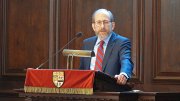In the sermon traditionally delivered by Harvard presidents on the first day of classes each new academic year, President Alan M. Garber spoke about the importance of academic institutions in supporting “the passion to seek truth”—and urged the assembly to defend universities’ values in times of calamity. That directive feels especially important, Garber said, “on the first morning of what will likely be a very challenging academic year, marked by events outside our control.”
Before being tapped to become president, Garber served as the University’s provost, a role in which he oversaw the totality of Harvard’s academic enterprise. The position afforded him a unique perspective on “the vast, wonderful, and pervasive sense of curiosity to be found here, curiosity that makes discovery of all kinds—and its application—possible,” he said. “I spent nearly 13 years marveling at the extraordinary interests and aspirations of our community. I witnessed many moments of joy and celebration punctuated by new questions, questions large and small…questions too numerous to answer in a single career or even a lifetime. But questions posed, considered, and refined…with confidence that the search for knowledge is eternal.”
That search for knowledge, Garber noted, has been a justification for morning prayers themselves. Attendance at the prayers had been mandatory for Harvard students through much of the nineteenth century, and a petition to remove that requirement in 1886 still stated the value of the service at its best: “to bring the passing and casual under the under the shadow of the eternal” in pursuit of “an unvarying, underlying truth.”
“That was a tall order in 1886—taller still in 2025,” Garber said, reflecting on the struggle common to academic institutions: how to test ideas within a community of divergent views. “This posing and considering and refining—this unceasing evolution of ideas…Though our efforts often lead to affirmation and agreement,” he continued, “they begin and proceed with confrontation and debate, fueled by a shared desire for deeper and richer understanding.”
He encouraged those gathered to share ideas that might spur disagreement: “Academic institutions, like religious institutions, depend on our passion to seek truth,” he said. “They depend on our determination to overcome doubt, disapproval, and dismissiveness. Solitude is an important ingredient, and internal debate can be as brutal as the criticism of others, but success nearly always depends on a supportive but critical community.”
Garber noted that Judaism—his own religion—is likewise “built on a foundation of debate and disagreement.” Judaism taught him about reasoning through Talmudic study, he explained, “the role of argument in advancing understanding,” and about practices that “build a community and bind its members” across millennia.
“At their best, institutions—academic, religious, and otherwise—provide a place and a framework to know one another, to challenge one another, to encourage one another, to elevate and celebrate one another,” he said. He continued: “That is some of what institutions do for us. What do they need from us in return? They need our commitment. We must recognize their value with even greater intention when confusion and hurry—and a host of other calamities—threaten to overwhelm them. It is up to us, the beneficiaries of the greatness and endurance of institutions, to defend and protect them, to steady and ready them so that they might continue to thrive.”









